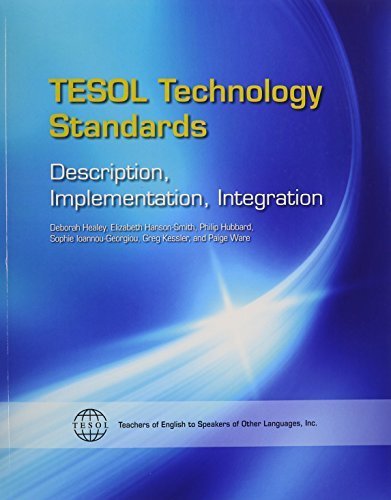Gaming to Meet the TESOL Technology Standards
It has been a decade since the publication of the TESOL Technology Standards. Since then, the technology landscape has shifted, but the relevance of the standards remains. What keeps them relevant is their restraint. Instead of focusing on specific technology, the standards advocate for educators to adopt a mindset toward technology as a foundational part of their classroom practice and to pursue professional development that fosters technology integration.
In teacher training workshops over the years, I have frequently advocated for using video games to meet the TESOL Technology Standards, as the skills needed to use games effectively showcase competence in the Technology Standards. In this month’s blog post, let’s walk through how video games can help us meet the three standards of Goal 1 of the TESOL Technology Standards.

Goal 1: Language teachers acquire and maintain foundational knowledge and skills in technology for professional purposes.
Standard 1: Language teachers demonstrate knowledge and skills in basic technological concepts and operational competence, meeting or exceeding TESOL technology standards for students in whatever situation in which they teach.
Meet this standard by playing more games! Games are a form of media literacy, so take the time to develop that literacy. Understanding “technological concepts and operational competence” in games translates to learning how to set them up for class and knowing how to control them. Often I hear from teachers they are not good at controlling games and so are reluctant to use them in class. Controlling games using the WASD keyboard setup or a game controller takes practice, so dedicate time to playing and your confidence with games will increase.
Standard 2: Language teachers demonstrate an understanding of a wide range of technology supports for language learning and options for using them in a given setting.
In conversations with teachers new to games in the classroom, a frequent topic is the lack of classroom technology and how it excludes using games. When choosing games for the classroom, look beyond high-end graphics and the need for computing power. Instead, consider the mechanics of the game and identify what other games share those same mechanics and find one that best fits the technology needs of your classroom. Once again, this comes with the development of a games literacy, and the more games you play the broader the knowledge base you’ll have to find the most appropriate game for your teaching and learning context.
For example, the popular social-deduction video game Among Us can be played on computers, but is also available on mobile devices. If students lack such devices, card-based games such as Coup or The Resistance offer the same social-deduction mechanics. If you lack the resources to buy card games, the talking-based game Werewolf has the exact same mechanics.
Standard 3: Language teachers actively strive to expand their skill and knowledge base to evaluate, adopt, and adapt emerging technologies throughout their careers.
Meet this standard by exploring the range of resources available to educators when deciding which games to play in the classroom. Common Sense Media can help determine what games are classroom friendly and age appropriate. Edutopia has a series of articles on game-based learning. Another great option for expanding your gaming knowledge base is Xbox Game Pass, which lets you play hundreds of games on a subscription model. Meanwhile, podcasts such as Game Maker’s Notebook, the Game Design Round Table, Game Jawns, and Triple Click can help you level-up your knowledge of games and how they are made.
I hope this month’s post helps level up your games literacy and unlocked new resources to use toward meeting the TESOL Technology Standards. Until next month, play more games!

About the author
Jeff Kuhn
Jeff Kuhn is the director of esports at Ohio University. He frequently delivers talks and keynote addresses on games and learning, game design, and the need for games literacy in educators. He is one of the founding moderators of the Electronic Village Online’s Minecraft MOOC, a community of practice for teachers learning to use Minecraft in the classroom. He has served on the TESOL CALL-IS steering committee, as the Gaming Special Interest Group chair for CALICO, and in the U.S. Department of State’s English Language Specialist program. His research interests include game-based learning, second language writing, and computer-assisted language learning.